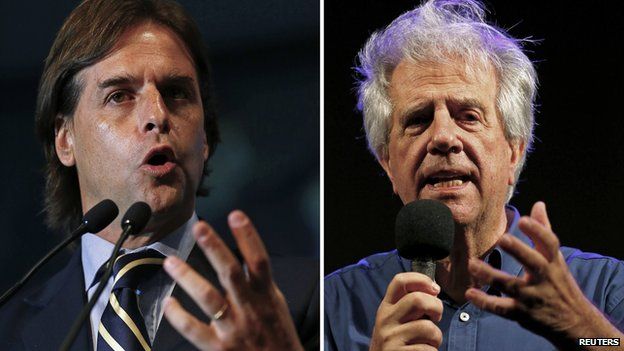Uruguay's presidential election goes to runoff
- Published

Tabare Vazquez of the Broad Front party has emerged as the winner of the first round of voting in Uruguay's presidential election.
But Mr Vazquez, the candidate of President Jose Mujica's party, fell short of an outright majority.
He will face Luis Lacalle Pou of the right-wing National Party, in a run-off election on 30 November.
President Mujica is barred by the constitution from running for a second consecutive term.
With most of the votes counted, Mr Vazquez had won over 46% of the vote.
Mr Lacalle Pou trailed behind with over 30%, but he swiftly secured the endorsement of the third placed candidate Pedro Bordaberry, of the conservative Colorado Party.
Uruguay's outgoing president, Jose Mujica, told Gerardo Lissardy of BBC Mundo that he was confident his party would continue leading the country.
However, he said that the election of Mr Vazquez would not necessarily mean there would be no change in policy.
"Every government is unique," he said."Probably a new government with Tabare would have the advantage of experience, from his previous period in power. Remember the presidency is not a profession, nor is it training. It's simply how you perform."
Tight runoff
Tabare Vazquez served as president of Uruguay in 2005-2010 and remains one of the most popular politicians in Latin America.
BBC correspondent Ignacio de los Reyes says the presidential run-off is expected to be tight. Mr Vazquez's young contender, Luis Lacalle Pou, is the son of a former president and has become a rising political star in recent months.
Both candidates have promised to keep social spending high and boost the economy.
Mr Mujica remains popular after leading Uruguay through a period of economic growth and wage rises, but he is barred by the constitution from running for a second consecutive term.
His government was behind social reforms such as the legalisation of marijuana, abortion and gay marriage.
But critics say it has failed to deal with problems in education, security and the environment.
Uruguayans were voting for their choice of president, vice-president and members of parliament at the same time. The Broad Front retained its majority in the senate and the chamber of deputies.
They were also voting in a controversial referendum on whether to lower the age at which a person can be criminally charged as an adult from 18 to 16. The proposal did not get more than the 50% vote it needed to be approved.
Are you in Uruguay? What is your reaction to the early voting figures? You can email your experiences to haveyoursay@bbc.co.uk.
- Published9 October 2014
- Published12 May 2014
- Published3 May 2014